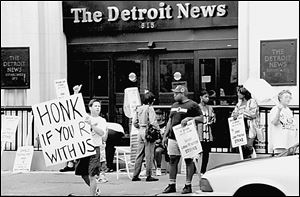
Detroit newspaper strike took a terrible toll
7/15/2005DETROIT - Ten years ago this week, thousands of workers walked off their jobs at the Detroit News and the Detroit Free Press in what was to become one of the longest and bitterest newspaper strikes in history.
And by most accounts, it ended in a crushing defeat for the unions.
Many experts cite the strike as proof that unions no longer have the power they did. Ben Burns, a professor of journalism at Wayne State University in Detroit and a former executive editor of the Detroit News, thinks the strike was lost once the newspapers showed they could still publish and distribute a paper.
Lou Mleczko, who was and is head of the Newspaper Guild of Detroit, doesn't claim the unions won. "But what the strike showed is that if people stay united, they can withstand the most vicious assault on their existence," he said in an interview last week in his union office, which is in a mostly vacant building on a once-grand boulevard in downtown Detroit.

Detroit s six newspaper unions walked out on July 13, 1995
Trouble was, the unions didn't stay united. Almost from the start, some members crossed the picket lines. The newspapers, Knight-Ridder's Detroit Free Press and Gannett's Detroit News, did a much better job of staying together. That was made easier since their business functions are run jointly by an entity called the Detroit Newspaper Agency, under a controversial agreement approved by the government in 1989.
The unions believe the newspapers wanted a strike. After their contracts expired, and months of negotiations, the newspapers announced they would arbitrarily institute the changes they were insisting on. (A spokesman for the Detroit Newspaper Agency did not return a phone call for this column.)
They had non-union replacement workers ready, and when the strike began, they missed only a day of publication before issuing a combined newspaper that they managed not only to print but deliver. It wasn't much of a newspaper, and early on, the going wasn't easy for the companies.
Hundreds of thousands of readers canceled subscriptions, and at first, advertisers stayed away in droves. The newspapers admitted losing $100 million, and independent observers believe the real figure was at least twice that.
But the six striking unions seem to have lost more. The unions took months to publish a strike paper. Meanwhile, the newspapers launched aggressive Internet newspapers right when the World Wide Web was first reaching a mass audience. Almost from the start, some workers crossed the picket lines. More and more did, as money ran out. In February, 1997, the unions made a unilateral offer to return to work, but the papers said, in essence, too bad.
They had hired replacement workers, which they refused to dismiss.
They were willing to take strikers back only on an as-needed basis, and totally refused to take those who they had fired for inappropriate activity during the strike.
Today, the unions still exist at both newspapers, and the unions finally agreed on new contracts in 2000. But the company eliminated hundreds of jobs, and workers now no longer have to agree to belong to the union.
"We had to agree to an open shop, and we didn't like that, but we have successfully negotiated two contracts now," Mr. Mleczko said.
Mr. Burns thinks the newspaper unions did themselves great damage by striking when they did. In his estimation, it was a near-total defeat for labor. "I don't think there is any doubt that it had a chilling effect on labor negotiations across the country," he said.
Mr. Mleczko, who was a reporter for the Detroit News for 24 years before going to work for the union, used to work for Mr. Burns. But he rejects his conclusions.
"We know for a fact that because of the unity we showed here in Detroit, that publishers in other cities - Cleveland, Philadelphia, Chicago, St. Louis - were able to resolve very difficult negotiations clearly with an eye to what had gone on in Detroit. Both management and unions said we don't want what happened in Detroit to happen here."
He has no doubt what happened in Detroit helped prevent strikes elsewhere. "They were horrified at what they saw going on here."
He knows, however, that his members paid a terrible price. But even if the newspapers won economically, they paid in circulation and goodwill. Not only did the newspapers suffer vast circulation losses - the subscribers never came back. In fact, the papers continue to lose customers.
Prior to the strike, their combined Sunday edition sold 1.1 million newspapers. A year ago, that had dwindled to 722,000. Today, it is 684,000. The daily figures are worse. As he prepared for a week of events commemorating the anniversary of the strike, Mr. Mleczko, alone in a lonely office in an aged building, said "there are no winners in a labor dispute like this."
In human terms, it would seem hard to disagree.